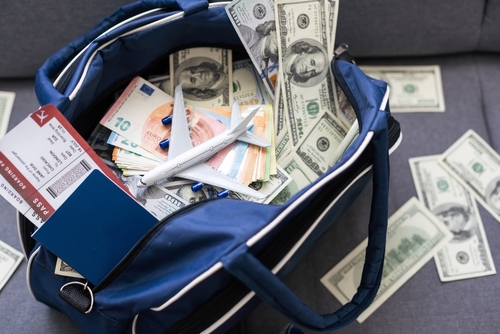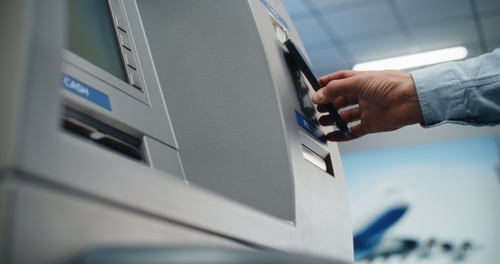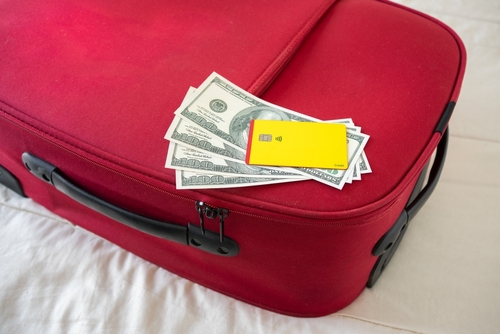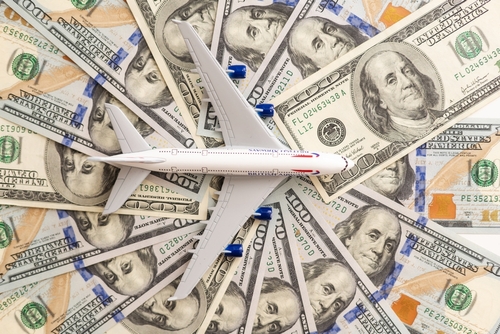Traveling is exciting, and it’s easy to get swept up in planning your next adventure. But that excitement can make it easy to overlook important details, like how much cash you can carry on a plane.
And though we live in a digital age, many places still rely heavily on cash, and having physical money can make things much easier. Whether you find cash more convenient or you’re traveling somewhere where cards aren’t always accepted, it’s important to understand the procedures that apply when you bring cash through airport security or across an international border.
Remitly understands that travel regulations can change, and we want to help you stay informed. Our latest guide breaks down the rules around carrying cash on a plane within, out of, and into the US. Learn how to declare large sums of money, what monetary instruments are, and tips for traveling with cash.
Carrying cash on domestic flights: no hard limits
When flying within the US, there’s no legal limit on the amount of cash you can bring on a plane. Because cash doesn’t pose a security threat, you’re free to carry as much as you’d like.
However, carrying large sums might draw attention during the security screening process and may lead TSA officers to ask you some questions or inspect your bag more carefully. If they suspect anything unusual, they may refer to law enforcement.
Tips for domestic cash travel
If you’re flying anywhere within the US with a large sum of cash, being prepared and taking safety measures will help you avoid delays. Here are a few tips to keep in mind:
- Keep cash in your carry-on bag or on your person, rather than in checked luggage, to reduce the risk of theft or loss.
- Bring documentation such as ATM receipts or bank withdrawal slips to show the legitimate source of the funds. This can make a big difference if you’re asked.
- Be prepared for questions. TSA officers may ask about where the money has come from or what’s going to be used for. You’re not obliged to answer, but refusing to do so may result in delays or further investigation.
- Be aware of the law. If law enforcement has reasonable suspicion or probable cause that the money is linked to criminal activity, they have the power to seize it.
If your trip includes traveling abroad or re-entering the US, the rules around carrying cash change, and there may be mandatory requirements around reporting or declaring the money.

International flights: declare $10,000 or more
When you enter or leave the US, the rules change slightly. You can still carry any amount of money, but amounts above $10,000 USD must be reported to US Customs and Border Protection (CBP).
What counts toward the $10,000 rule?
When traveling, the definition of “money” is broader than just cash. The following count toward the $10,000 threshold:
- US and foreign currency (coins and paper money)
- Traveler’s checks
- Money orders
- Bearer negotiable instruments (for example, certain cashier’s checks, promissory notes, or bearer bonds/securities if they meet the legal criteria)
If the combined value of these items exceeds $10,000, the total must be declared.
What about gold or other valuables?
Gold bullion, bars, medals, and jewelry are considered merchandise, not monetary instruments, but they still need to be declared. Gold coins that are considered legal tender may count as currency or monetary instruments, depending on their exact legal status. If you have any doubt, declare the items and let CBP officers determine their classification.
Don’t worry about your debit or credit card, because money in your bank account remains where it is, even when you’re flying internationally. The $10,000 limit applies only to physical cash and monetary instruments.
Tip: If your family or group is traveling together and the combined amount of your cash and monetary instruments exceeds $10,000, you’ll need to declare it, regardless of what each individual is carrying.
How to legally declare cash over $10,000
Traveling with large sums of money is perfectly legal, but you must follow the official declaration process in order to comply with US law.
Here’s how to do it correctly:
Step 1: Get FinCEN Form 105
This is the “Report of International Transportation of Currency or Monetary Instruments.” You can download the PDF from the official FinCEN website, pick up a paper copy before leaving or upon entering the US, or complete it online.
Step 2: Complete the form accurately
You’ll need to provide the following information:
- Your personal details: your full legal name and address
- Travel information: flight and port of entry/exit
- Details of what you’re carrying: types of monetary instruments, currency, and their amounts
Take your time filling out the form and check that all information is correct before submitting it.
Step 3: Submit the form to CBP
- If you fill out the form on paper, present it to a CBP officer upon departure from or entry into the US.
- If you file electronically, you must arrive at the port of entry within 72 hours of submission. If you don’t, you’ll have to submit the form again.
Step 4: Know what happens when you arrive
When you enter the US, declaring on FinCEN Form 105 doesn’t replace the standard customs declaration; you still need to declare your cash or monetary instruments on the standard customs form as well.
If you fail to declare properly, CBP may confiscate your money, and you may face civil or criminal penalties.

Consequences of not declaring cash
Failure to declare cash or other monetary instruments totaling more than $10,000 USD when leaving or entering the US can have serious consequences. It’s legal to carry any amount, but the law requires you to report amounts over the threshold. If you don’t, you risk:
- Seizure or forfeiture of the undeclared funds: CBP may temporarily or permanently confiscate the cash or monetary instruments, even if they come from a legitimate source. Recovering the funds is often a lengthy and costly process.
- Civil penalties: Fines can equal or exceed the value of the undeclared amount.
- Criminal penalties: If there’s suspicion of criminal activity, authorities may charge you under criminal law. Conviction can lead to fines of up to $500,000 and up to 10 years in federal prison.
- Cancellation of travel privileges: If you have a history of non-compliance with CBP regulations, your name may be flagged in databases and privileges such as Global Entry may be revoked.
The key takeaway is that these consequences aren’t limited to people who intentionally conceal items. Failing to declare or giving an inaccurate declaration is enough to bring about forfeiture of the money or fines. Make sure you understand the regulations and make the correct declarations. If you’re unsure, err on the side of caution and declare.
Remember, when you’re flying domestically, there’s no legal requirement to declare any cash or monetary instruments. However, during security screening, the TSA is authorized to notify law enforcement if they notice large amounts of cash, and law enforcement can seize the cash if they have probable cause to believe it’s connected to criminal activity.
Tip: Dogs working in airports are trained to smell large amounts of cash. Don’t be alarmed if they approach you; just keep your papers accessible in case the agents ask.
Tips for flying internationally with cash
Here’s a quick review of how to travel internationally with large sums of money:
- Plan ahead. Before you travel, make a list of how much cash or monetary instruments (e.g., traveler’s checks, money orders) you’ll be carrying, and whether it all exceeds $10,000 USD. Remember to also take into account anything your travel companions will be carrying.
- Have your paperwork ready. Download or print FinCEN Form 105 and fill it out accurately before you travel (or plan to complete it at the port of entry/exit).
- Carry documentation of the money’s origin. This isn’t required, but it could help explain the source of funds if you’re asked.
- Keep all documents together so you can easily produce them for border officials.
- Check the rules for your destination country. Any countries that you are traveling to (or transiting through) will have their own rules about carrying cash, so do your research in advance to make sure you comply.
- Be cautious. Certain security risks can come with carrying large amounts of cash. Avoid displaying it openly.

Travel confidently with cash on a plane
If you’re traveling by plane within the US, there’s no limit on how much cash you can carry. If you’re traveling abroad or reentering the US, you can carry up to $10,000 in cash or monetary instruments. Anything above that must be declared to US Customs and Border Protection. Knowing what you need to do ahead of time and preparing the right documentation will help you travel with confidence.
With the right information, you can board your plane knowing that you’re ready for the journey ahead.
Looking for more travel resources? Check out our blog for more!
FAQs
Do I need to declare money on domestic flights?
No, you don’t need to declare cash of any amount on domestic US flights. However, if you carry large sums, TSA officials may ask you some questions.
How much cash can I carry into or out of the US?
You can carry up to $10,000 USD in cash and monetary instruments into or out of the US. This includes US and foreign currency (coins and paper money), traveler’s checks, money orders, and bearer negotiable instruments, such as promissory notes.
Does the rule apply to debit or credit cards?
No. You don’t have to declare your credit or debit cards, or the money in your bank accounts.
Can I carry gold or other valuables instead of cash?
Yes, but gold bullion, bars, and medals must be declared when crossing international borders. Any cash or monetary instruments that exceed the declaration threshold must also be reported.

